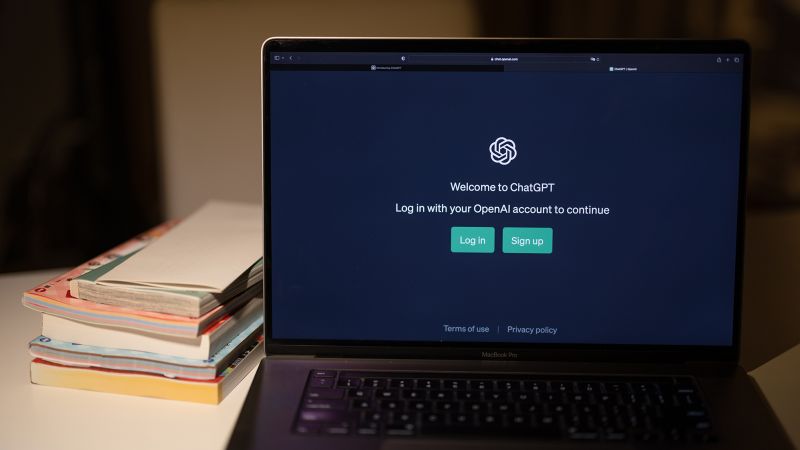CNN
—
When Diane Gayeski, a trainer of strategic communications at Ithaca Faculty, receives an essay from one in every of her scholars, she runs a part of it via ChatGPT, asking the AI device to critique and recommend learn how to strengthen the paintings.
“The best way to look at AI for grading is as a teaching assistant or research assistant who might do a first pass … and it does a pretty good job at that,” she informed CNN.
She displays her scholars the comments from ChatGPT and the way the device rewrote their essay. “I’ll share what I think about their intro, too, and we’ll talk about it,” she mentioned.
Gayeski requires her magnificence of 15 scholars to do the similar: run their draft via ChatGPT to look the place they may be able to create enhancements.
The emergence of AI is reshaping schooling, presenting actual advantages, equivalent to automating some duties to independent up year for extra personalised instruction, but in addition some fat hazards, from problems round accuracy and plagiarism to keeping up integrity.
Each lecturers and scholars are the usage of the unutilized generation. A document via technique guide company Tyton Companions, backed via plagiarism detection platform Turnitin, discovered part of school scholars old AI equipment in Fall 2023. In the meantime, moment fewer college contributors old AI, the share grew to 22% of college contributors within the fall of 2023, up from 9% in spring 2023.
Lecturers are turning to AI equipment and platforms — equivalent to ChatGPT, Writable, Grammarly and EssayGrader — to help with grading papers, writing comments, growing lesson plans and growing assignments. They’re additionally the usage of the burgeoning equipment to manufacture quizzes, polls, movies and interactives to up the ante” for what’s anticipated in the study room.
Scholars, at the alternative hand, are leaning on equipment equivalent to ChatGPT and Microsoft CoPilot — which is constructed into Assurance, PowerPoint and alternative merchandise.
However moment some colleges have shaped insurance policies on how scholars can or can’t importance AI for schoolwork, many don’t have pointers for lecturers. The apply of the usage of AI for writing comments or grading assignments additionally raises moral issues. And oldsters and scholars who’re already spending loads of 1000’s of greenbacks on tuition might marvel if an never-ending comments loop of AI-generated and AI-graded content material in faculty is usefulness the year and cash.
“If teachers use it solely to grade, and the students are using it solely to produce a final product, it’s not going to work,” mentioned Gayeski.
The year and playground for AI
How lecturers importance AI relies on many elements, in particular on the subject of grading, in keeping with Dorothy Leidner, a trainer of industrial ethics on the College of Virginia. If the fabric being examined in a massive magnificence is in large part declarative wisdom — so there’s a unclouded proper and fallacious — after a trainer grading the usage of the AI “might be even superior to human grading,” she informed CNN.
AI would permit lecturers to grade papers quicker and extra persistently and steer clear of fatigue or boredoms, she mentioned.
However Leidner famous on the subject of smaller categories or assignments with much less definitive solutions, grading must stay personalised so lecturers can handover extra particular comments and get to grasp a pupil’s paintings, and, due to this fact, move over year.
“A teacher should be responsible for grading but can give some responsibility to the AI,” she mentioned.
She steered lecturers importance AI to take a look at sure metrics — equivalent to construction, language importance and grammar — and provides a numerical ranking on the ones figures. However lecturers must after grade scholars’ paintings themselves when in search of novelty, creativity and intensity of perception.
Leslie Layne, who has been educating ChatGPT absolute best practices in her writing workshop on the College of Lynchburg in Virginia, mentioned she sees the benefits for lecturers but in addition sees drawbacks.
“Using feedback that is not truly from me seems like it is shortchanging that relationship a little,” she mentioned.
She additionally sees importing a pupil’s paintings to ChatGPT as a “huge ethical consideration” and probably a breach in their highbrow feature. AI equipment like ChatGPT importance such entries to coach their algorithms on the entirety from patterns of accent to learn how to create sentences to details and figures.
Ethics trainer Leidner correct, announcing this must in particular be have shyed away from for doctoral dissertations and grasp’s theses for the reason that pupil may hope to submit the paintings.
“It would not be right to upload the material into the AI without making the students aware of this in advance,” she mentioned. “And maybe students should need to provide consent.”
Some lecturers are leaning on device known as Writable that makes use of ChatGPT to backup grade papers however is “tokenized,” so essays don’t come with any private data, and it’s no longer shared without delay with the machine.
Lecturers add essays to the platform, which used to be lately bought via schooling corporate Houghton Mifflin Harcourt, which after supplies steered comments for college students.
Alternative educators are the usage of platforms equivalent to Turnitin that boast plagiarism detection equipment to backup lecturers establish when assignments are written via ChatGPT and alternative AI. However some of these detection equipment are a ways from foolproof; OpenAI close unwell its personal AI-detection device endmost life because of what the corporate known as a “low rate of accuracy.”
Environment requirements
Some colleges are actively operating on insurance policies for each lecturers and scholars. Alan Reid, a analysis assistant within the Middle for Analysis and Reform in Training (CRRE) at Johns Hopkins College, mentioned he lately spent year operating with Okay-12 educators who importance GPT equipment to manufacture end-of-quarter personalised feedback on document playing cards.
However like Layne, he said the generation’s skill to write down insightful comments remainder “limited.”
He these days sits on a committee at his faculty that’s authoring an AI coverage for college and group of workers; discussions are ongoing, no longer only for how lecturers importance AI in the study room however the way it’s old via educators on the whole.
He recognizes colleges are having conversations about the usage of generative AI equipment to manufacture such things as promotion and tenure recordsdata, efficiency opinions, and activity postings.”
Nicolas Frank, an assistant trainer of philosophy at College of Lynchburg, mentioned universities and professors want to be at the identical web page on the subject of insurance policies however want to keep wary .
“There is a lot of danger in making policies about AI at this stage,” he mentioned.
He worries it’s nonetheless too early to know the way AI might be built-in into on a regular basis while. He’s additionally involved that some directors who don’t educate in school rooms might craft coverage that misses nuances of instruction.
“That may create a danger of oversimplifying the problems with AI use in grading and instruction,” he mentioned. “Oversimplification is how bad policy is made.”
To begin, he mentioned educators can establish unclouded abuses of AI and start policy-making round the ones.
Leidner, in the meantime, mentioned universities will also be very top stage with their steering, equivalent to making transparency a concern — so scholars have a proper to grasp when AI is being old to grade their paintings — and figuring out what kinds of data must by no means be uploaded into an AI or requested of an AI.
However she mentioned universities will have to even be seen to “regularly reevaluating as the technology and uses evolve.”



